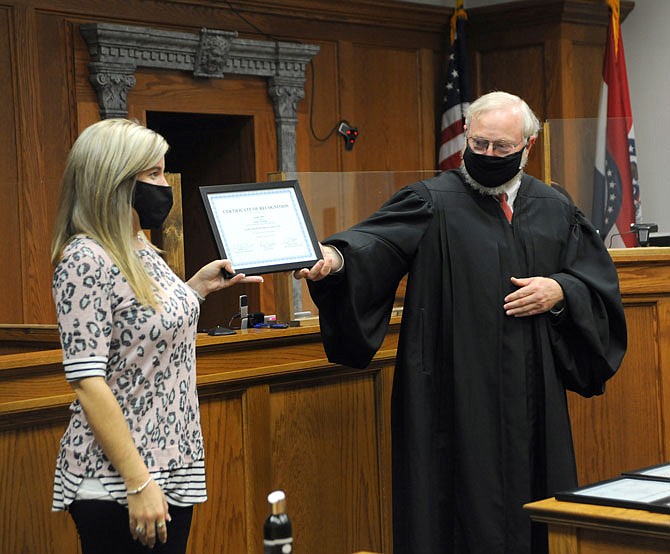Seven women make up the county's newest volunteers looking out for children.
Circuit Judge Jon Beetem swore in six of the new members of Capital City Court Appointed Special Advocates during a ceremony in the Cole County Courthouse early Thursday evening.
Emily Wright, Jennifer Enloe, Jennifer Carroll, Brenda Hatfield, Lisa Eastman and Andrea Sillars took an oath as volunteers during the ceremony for the 18th CASA class in the county.
Paula Gerling, who was not available, will be sworn in later.
CASA is a volunteer-powered network of people from all walks of life who believe society has a fundamental obligation to make certain children thrive, are treated with dignity and are kept safe.
CASA volunteers, appointed by judges, watch over and advocate for abused and neglected children. They try to make sure children don't get lost in overburdened legal and social service systems or languish in inappropriate group or foster homes. Volunteers remain on their clients' cases until the children are placed in safe, permanent homes.
Beetem told the new recruits he'd try to remember each of their names. The group brings to 70 the number of CASA volunteers for Cole County courts. However, even at 70 volunteers, there is need for many more, Capital City CASA Executive Director Gina Clement said.
Beetem said they will never be able to count on how long they'll be in court. During court, he's always trying to get as much information about the cases as he can.
Story continues below video
"Sometimes your case will go quick. Sometimes it doesn't - it's a grind," Beetem said. "And you're always behind."
It does take a village to raise the child when the parents aren't in the picture, he said.
"Generally, we're here because the parents can't deal with what it is and we have to substitute different pieces," he said. "CASA is one of those pieces. During the pandemic, our CASA volunteers (were some) of the best links we had with these kids."
They drove by, they Facetimed, or did whatever they had to do to see the children, Beetem said.
"CASA gives me a great deal of comfort that someone has looked at, thought about and tried for these kids," he said.
A friend had talked about service and value, Beetem said. It's service that gives life value, he said.
"You provide us information that is sort of raw and unbiased. You're not burdened by your job as a legal advocate, so you're not thinking about the rules of evidence, and 'How can I get this in?'" he said. "It's sort of a pure 'Here's what this kid needs to say and I'm going to help this kid say it.'"
At the same time, it's a situation where the advocates see what the child needs, and helps the child get it, he continued.
And the cases continue to pile up, Clement said.
"We need volunteers. We've got about 20 teenagers waiting," she said. "We need people who want to take on those cases."
More male volunteers would be helpful too, she said.
This year has been very busy for CASA, Clement said. The organization has taken in about 46 children since the pandemic really hit in March. And because schools moved to online learning in spring and part of this fall, a worry is some children in troublesome situations will not be found.
"There are a lot more kids that fly under the radar because if you're not in the seat for education, we don't have the eyes on you that you might if you were going to school," she said.
Pillars said she worked as an attorney in state government for a number of years. And while the work was rewarding, she wanted to do something more meaningful. She worked in the Attorney General's Office, handling sexual predator cases.
"(CASA is) a great program. It's a meaningful way to provide a service for children that is so needed," she said.
She became aware of the program, when an acquaintance used her as a reference to be a CASA volunteer. She had been looking for a volunteer opportunity, and with her background, Pillars felt like Capital City CASA would be a good fit.
It's a wonderful, wonderful thing that they're doing," she said.
"This is family preservation - which is what juvenile court really is," Beetem said. "It is a frustrating business, because there really is no statistical evidence that it works."
There is good anecdotal evidence it works, he added.
"You realize that one out of every two kids removed never goes home," he said. "A kid cannot have too many people caring about them."

